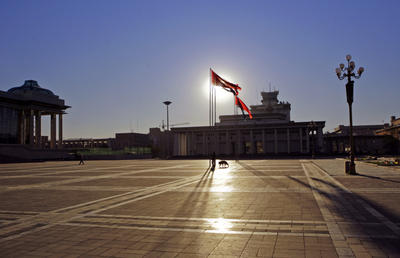Then-President Nambaryn Enkhbayar declared a state of emergency and five civilians were killed in the subsequent police crackdown.
The lantern demonstration reflected a genuine desire in Mongolia to avoid a repeat of the events of 2008. That commitment was evident not just in the peaceful symbolism of the public, but also in the hard work of those in government, civil society and, to a degree, political parties, to build public trust in the electoral process in the months preceding the 2012 parliamentary election.
In December 2011 the parliament passed a new electoral law that introduced partial proportional voting, electronic voting, election observation by domestic civil society organisations and a quota for female candidates. The new law also enfranchised Mongolians residing overseas. Although not all of the changes were realised — for instance, biometric ID cards were not ready in time — the General Election Commission did institute most of the innovations, and civil society educated the public about the changes and their implications.
Those efforts were broadly successful. There was no violence during or after the polls and, despite protestations from the MPP that the electronic voting system was flawed and some well-documented cases of vote buying, the results were broadly accepted. Or at least, not stridently rejected. The DP, which won the election but failed to secure an outright majority, has formed a coalition government and the new parliament has begun its work. So, Mongolia has not only held peaceful elections, it has also peacefully changed government. No mean feat for a democracy in its early twenties.
Yet talk of a stalling democratisation process has dominated international press on Mongolia over recent months, prompted by the arrest and eventual guilty verdict and sentencing of former President Enkhbayar. Amnesty International also released a statement critical of the government’s handling of the arrest, labelling the charges arbitrary.
Enkhbayar, widely known as ‘father of corruption’ in Mongolia, was arrested on corruption charges in April 2012 and subsequently ruled ineligible to run in the June 2012 elections. Enkhbayar lost the 2009 presidential race to DP candidate Tsakhia Elbegdorj, a loss widely interpreted as a backlash to his handling of the 2008 election riots. Two years later, Enkhbayar split from the MPP, starting a new party that appropriated the old MPP name, the Mongolian Revolutionary People’s Party (MPRP). The MPRP is a junior member in the new DP-led coalition.
While the timing of Enkhbayar’s arrest was certainly circumspect and ill-advised, many are exasperated to find Mongolia receiving condemnation for tackling what the international community consistently cites as one of the country’s greatest problems. Mongolia ranks 120 out of 183 countries rated on Transparency International’s 2011 corruption perceptions index. The United Nations, foreign companies and governments have all highlighted the importance of tackling corruption, not just for Mongolia’s own benefit, but also to improve the foreign investment climate for the resource-rich economy that is turning heads with the speed of its growth.
Ironically, there was another recent trial that attempted to respond to international calls to address impunity, which did not receive any international coverage despite representing a much clearer violation of human rights than the Enkhbayar case. On 6–7 June four senior members of the Mongolian police force were tried in a secret court in Ulaanbaatar. Details of the hearing were not released until after the men were sentenced — three received jail terms of up to three and a half years — and the defendants were not allowed legal representation. Mongolia’s Human Rights Commission attempted to observe the trial when alerted by the defendants’ family members but were denied admission.
International condemnation relating to the Enkhbayar trial is misleading in the face of the deafening silence regarding these former policemen, whose human rights were more blatantly breached. It also devalues the hard work of many in Mongolia dedicated to strengthening governance and addressing corruption.
Enkhbayar is likely to appeal. He has already been transferred from prison to a hospital on health concerns, as he was before the trial. If the new coalition government, or the courts, allow the former president special treatment, the cynical in-crowd of Mongolian politics will be maintained, and the untouchability of the men who dominate it confirmed. Such an outcome would further erode the public’s faith in the ability of democracy to deliver for all, and undo the hard work of many in Mongolia to deliver a fair and just society.
Amy Dowler has a Master of Arts (International Relations) from the Australian National University.


Thank you for this intelligent analysis.